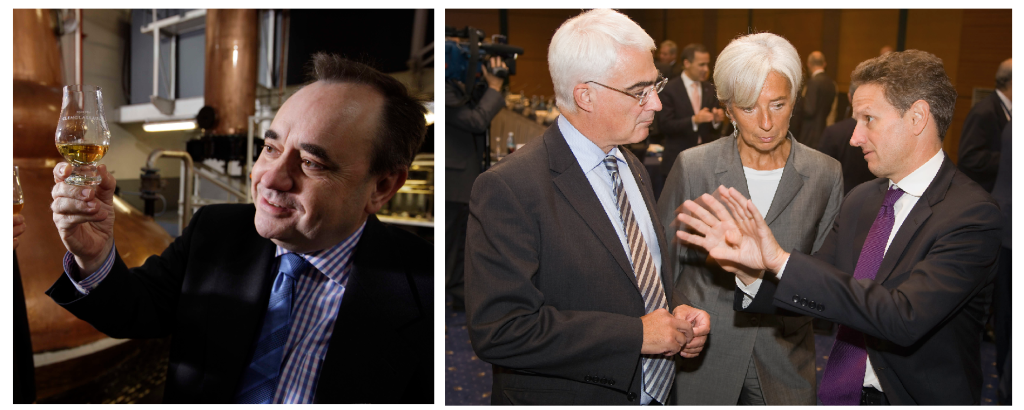Democratic round-up: the Salmond/Darling Scottish independence debate
Last night, the First Minister of Scotland, the Scottish National Party’s Alex Salmond went head-to-head with the Better Together campaign’s Chairman, and the former Labour Chancellor of the Exchequer, Alastair Darling. Here, Democratic Audit’s Sean Kippin rounds up the response from the blogosphere, academia, and our esteemed newspaper columnists.
The consensus amongst the commentariat is that First Minister Salmond was bettered by his more understated rival, with pundits generally differing only in the degree to which this was the case. Writing on the Conversation, David McCausland of the University of Aberdeen argues that Darling won “on balance” by “hammering away at his weak point” – namely, the creation of an independent fiscal and monetary policy within the confines of maintaining the pound. Also on the Conversation, Neil Blain of the University of Stirling laments what was missing from the debate on both sides, with Salmond neglecting to discuss the UK’s London-centricity and the Conservative Party’s growing Euroscepticism. He also, however, feels that Darling “won” the debate.
Responding to the presentational element of the evening’s proceedings, the Chief Executive of the PRCA (The Public Relations Consultants Association) Francis Ingham argues that what made the event interesting was the willingness of both men to play against type, possibly to the detriment of each. Nonetheless, he says that neither man “won” the debate, but each managed to avoid the large “elephant traps” which litter debates such as this.
The Financial Times’ Janan Ganesh (£) focuses on the strategic victory of the ‘No’ campaign in focussing primarily upon hard data rather than being tempted by a more abstract emotional argument in favour of the union which, in all likelihood, would have backfired. He also notes that the political cultures of Scotland and England have become almost completely disentwined, an insight he backs up by pointing out that the loudest cheers of the night were reserved for Salmond’s espousal of the kind of economic policy which England has largely avoided since the 1970s.
The Guardian’s coverage of the debate showed that, at least according to a snap poll of 500 Scottish voters, Darling won what was at times an ill-tempered and tumultuous debate. The piece also offers an interesting insight into the approaches of the two sides in attempting to influence press coverage of the debate, with a Better Together source saying: “The yes side claimed it would be Darling’s Bannockburn but it turned out to be Salmond’s Waterloo. Alistair won because of his forensic questions on currency”, while the Yes campaign was less effusive in its praise of for its leading light, with a source being quoted as saying “We think he used the opportunity to get our message across. We think he was successful.” Despite the poll victory for Darling, the pro-independence campaigner and academic Gerry Hassan points out that undecided voters thought Salmond won the debate by a small margin.
Professor John Curtice of Strathclyde University is one of a number of commentators who lament the shortcomings of the clash. Writing in the Scotsman, he argues that voters were subjected to “a gladiatorial contest partisans could cheer but probably left most undecided voters cold.” He argues that both Darling and Salmond missed the opportunity to reach out to the numerous undecided voters, and erred in focussing on the pet concerns of their own supporters, with Darling talking largely about currency, and Salmond about Scotland being saddled with a Conservative-led Government for which it did not vote. Curtice expands on his arguments, backed up with more hard polling data, on the What Scotland Thinks blog where he puts the case for thinking of the debate as a draw given the small numbers involved when it comes to polling.
David Watt of the Scottish Institute of Directors writes on the Huffington Post that the debate represented little more than a restatement of either sides well-established arguments and talking points, with neither man able to land a ‘killer blow’ or deliver a memorable line. However, he too thinks that Darling ‘edged’ the debate over his more bombastic counterpart.
Whilst agreeing that there was no “knockout blow”, Jamie Bartlett of Demos shows that the closest anyone came was Darling’s demand of his rival that he outline his “plan B” in the event that Scotland were unable to to use Sterling as its currency. That is but one morsel from an impressive range of findings, which shows what social media thought of the night’s events. In keeping with the generally negative response to the debate as a whole, Bartlett shows that while both men received more “boos than cheers”, Salmond “lost less badly” than Darling – at least as far as Twitter is concerned. Disagreeing with that analysis is the Telegraph’s Tim Stanley, who argues that Darling won well, and that when he’s finished “saving the Union” it might be worth it for him to consider “saving his party” with Ed Miliband apparently incapable of performing as well in a pre-election debate.
Rather more positive about the debate as a whole is Anne Perkins of the Guardian, who describes it as a ‘a compelling two hours of political debate between the two versions os Scotland’s future’, though she too feels Darling got the better of the ‘under pressure’ Salmond. Paul Cairney of the University of Stirling argues on his blog that we should be wary of “judging Salmond and Darling according to who would win a high school or University debating match” continuing “This is just a hunch, but my guess is that most Scottish voters think that those debate clubs are for arses”.
However, English viewers were unfortunately deprived of the opportunity to see Salmond apparently bite Darling during the debate, due to a fault on the only website which was broadcasting the debate south of the border. At least according to the satirical Daily Mash website, who quote an obscure academic named Julian Cook alleging that Darling once lost a debate to a washing machine.
—
Note: this post does not represent the views of Democratic Audit or the LSE. Please read our comments policy before posting.
—
 Sean Kippin is Managing Editor of Democratic Audit, and is responsible for DA’s website, blog and wider output. He has a BA in Politics from the University of Northumbria and an MSc in Political Theory from the LSE. He has worked for MPs Nick Brown and Alex Cunningham, as well as the Smith Institute think tank. He has been at Democratic Audit since June 2013, and can be found on twitter at @se_kip.
Sean Kippin is Managing Editor of Democratic Audit, and is responsible for DA’s website, blog and wider output. He has a BA in Politics from the University of Northumbria and an MSc in Political Theory from the LSE. He has worked for MPs Nick Brown and Alex Cunningham, as well as the Smith Institute think tank. He has been at Democratic Audit since June 2013, and can be found on twitter at @se_kip.






 Democratic Audit's core funding is provided by the Joseph Rowntree Charitable Trust. Additional funding is provided by the London School of Economics.
Democratic Audit's core funding is provided by the Joseph Rowntree Charitable Trust. Additional funding is provided by the London School of Economics.
John Curtice is at Strathclyde, not Stirling.
Democratic round-up: the Salmond/Darling Scottish independence debate
https://t.co/u14hMS25qG
Did you watch the Salmond/Darling debate? @se_kip brings us the best of the reaction: https://t.co/fSNsfZdsoI
Democratic round-up: the Samond/Darling Scottish independence debate https://t.co/0shYrREos4
Democratic round-up: the Salmond/Darling Scottish independence debate by @se_kip https://t.co/UzjzRosNBE
Democratic round-up: the Salmond/Darling Scottish independence debate https://t.co/3r2Rol9SwV